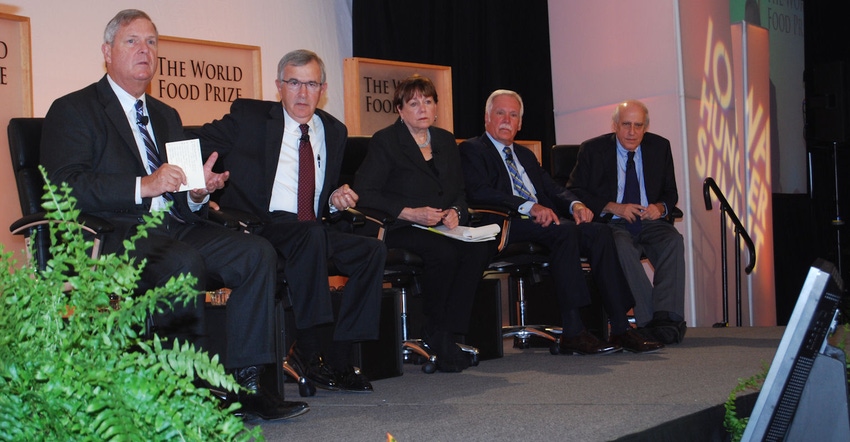October 20, 2017

Should Congress separate food assistance programs from agriculture programs in the new 2018 farm bill? Five former USDA Secretaries of Agriculture say both types of programs should be kept together in the farm bill. Some policy experts suggest taking food assistance programs—such as SNAP and WIC—out of the farm bill and making them stand alone programs. SNAP is the Supplemental Nutrition Assistance Program—formerly referred to as food stamps—and WIC is the Women, Infants and Children program. Both are currently funded in the federal budget as USDA programs.
“If you were to separate those programs—if you were to take SNAP and WIC out of USDA—you’d have an incredibly difficult time getting a farm bill passed,” said former U.S. Ag Secretary Tom Vilsack.
The former Iowa governor chaired a panel discussion on U.S. and world food programs at the 2017 Iowa Hunger Summit, a day-long symposium that began this week’s World Food Prize events in Des Moines. Joining Vilsack on the panel were former ag secretaries Mike Johanns, Ann Veneman, Ed Schafer and Dan Glickman. All agreed with Vilsack’s observation, and they oppose splitting agriculture and nutrition programs in the farm bill.
Don’t anticipate major changes in 2018 farm bill
The secretaries only expect tweaks to current programs provided in the next farm bill and don’t anticipate any major policy changes in the legislation. They agree, for the new farm bill to be approved by Congress and signed by President Donald Trump, it will have to provide improved efficiencies in the programs—ag as well as food aid programs.
“Today, with the administration’s focus on change and cost reduction for the federal budget, cuts in spending and finding ways to make USDA programs more efficient will have to be part of a new farm bill if we are going to see it passed and signed into law,” said Schafer, who served as ag secretary from 2008-09. “There are efficiencies that can be put into the farm bill programs to make them less costly, and that can provide better service to farmers, ranchers and landowners,” he said.
A major focus of the five secretaries’ panel discussion was on how USDA food aid and nutrition programs such as SNAP could be used to address obesity and health problems such as diabetes among people who qualify for the program.
Should SNAP participants be more restricted?
Vilsack asked the panel if people using SNAP should be more limited in what food they buy? Glickman, ag secretary from 1995 to 2001, pointed out that alcohol, tobacco, paper and pet food are among products not eligible for purchase through SNAP. “But with increasing rates of obesity among Americans today, this is an issue that should be looked into,” he said.
The other panelists agreed with Glickman who added, “This is a tough problem to address because it involves judgement calls on what is and isn’t good for you to eat.” He termed it a complicated problem that is likely to get a simple, but likely wrong solution. Many Americans are eating a lot of calorie-dense foods marketed in a variety of ways, yet Medicaid and Medicare are the fastest-growing parts of federal budget spending.
Schafer, a former North Dakota governor who was U.S. ag secretary from 2008 to 2009, said limiting which individual foods people could buy on SNAP would likely cause a huge outcry. “What if the government restricted pork purchases?” said Schafer. “I imagine Chuck Grassley would have a few things to say about that,” noted Johanns, as Grassley is Iowa’s senior senator and Iowa is the number one hog producing state.
Emphasis should be on nutrition, not just food
Veneman, ag secretary from 2001-05, said the nation’s food assistance program should be more focused on nutrition. “We should be talking a lot more about nutrition and not just hunger. Nutrition is the key word. If both Medicaid and SNAP are going to be funded by the federal government, more emphasis should be placed on healthier foods.”
The U.S. needs “more education on food nutrition,” said Veneman. Since this topic is so politically charged, she suggests Congress and USDA take a pilot program approach. Also aggravating today’s nutrition problem is the fact that “People don’t know how to cook anymore,” she said. That fundamental change is driving unhealthy eating habits.
There is a growing effort in some states to increase the tax on soft drinks, and where they’ve tried this tactic, they’ve seen soft drink consumption decrease. “But it’s not so much from taxes,” said Veneman. “It’s from the increase in information available telling Americans why they shouldn’t drink sugary soft drinks.”
Veneman added, “Around the world, we now have more people dying of non-communicable diseases than communicable diseases. If we don’t pay more attention to human nutrition, and not just hunger, this will become a global problem.”
Fundamental issue that needs to be addressed
The importance of nutrition is even expressing itself as a challenge to the U.S. military, About 20% of the young people who want to join the military today are considered too obese and are refused military service. And there are an increasing number of people already in the military who can’t stay in because they have become too overweight.
Johanns agreed with Veneman, the issue of restricting food items would not likely gain traction in the 2018 farm bill debate. Veneman says Harvard University has proposed a farm bill program for doctors to prescribe healthier foods and vegetables to people with certain medical issues. “There is a big push now to potentially create a pilot program for actual medical nutrition to be provided for people who have medical conditions who are using USDA food programs, such as SNAP,” she added.
One of the challenges in tying healthy foods programs into USDA is the cost of those programs don’t factor in the long-term potential savings in another area of the federal budget. That is, there is no offset for future savings from reduced diabetes treatments in the Medicaid program, for example. Glickman and Veneman are currently involved in a project in Washington, D.C. looking into this specific issue.
Should government get stricter on who qualifies?
Vilsack asked the panel: Should the government get stricter on who qualifies for SNAP benefits? Schafer answered, “People who can work, should work and the federal government should support those who are unable to work.” Glickman said, “Most people receiving SNAP benefits are not able-bodied people who can find work. Most are families with small children, the elderly and the disabled.”
Johanns, a former Nebraska governor, believes “Work requirements will likely be a point of discussion as Congress debates a proposed new farm bill. You’ll see more emphasis put on work or training requirements. The question is: Can people make it work if they are only earning the minimum wage? The answer is probably not.”
Fighting hunger while reducing wasted food
Bringing up another USDA-related topic, “Food waste is a huge problem,” said Veneman, former executive director of the United Nations Children’s Fund. Panel members cited figures and studies, agreeing that around the world about 30% to 40% of the food produced is wasted. In the developing world it’s more of an issue of lack of storage or problems with insect infestations. But in the developed world such as in the U.S., it’s an issue of food waste occurring at grocery stores and restaurants and with crops and food products lost during harvesting and left in the field.
Vilsack said efforts are now being made to provide low-cost storage of grain and food products in developing countries, and also more projects are getting underway in more countries to get unused food to families who can use it.
About the Author(s)
You May Also Like






